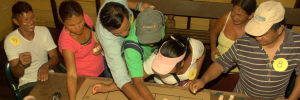Over 35 years ago Robert Axelrod invited several people working in the area of social sciences to the tournament. The idea was simple – win by earning the most in the iterated Prisoner’s Dilemma. Each person had to create an algorithm that would later compete with other automated players. Hence, the one that earns the most after multiple confrontations with randomly selected opponents becomes the winner.1
Why is it interesting from the sustainability point of view?
The basic idea behind Prisoner’s Dilemma is the conflict between individual and group rationality.
This struggle is also the base for the tragedy of the commons. Prisoner’s Dilemma is one of the simplest conceptualizations of this problem, and that is why it is very popular among researchers.2
But, what if we think it may be too simplified?
What if we make the model of common-pool resource more complex and involve more stakeholders?
We put this idea to test on one of the workshops during Summer Institute on Bounded Rationality in Max Planck Institute for Human Development. It was conducted by Piotr Magnuszewski from Centre For Systems Solutions and Peter Todd from Indiana University. Participants were asked to create and program algorithms designed to play one of the versions of About that Forest game. They competed with randomly chosen opponents and with copies of itself.
The idea was to test out the multi-agent tournament as a research tool and work out the methods of analyzing data.
Such investigations may give more insight into how people make decisions in the context of common-pool goods problem and how it affects the state of the resource. Consequently, it enables us to check which properties of decision heuristic give it a competitive edge against others. It makes it cooperate more or guides it towards the conservation of the commons. We can try to assess how the complexity of the algorithm and type of data it processes influence its performance in all of these categories. Furthermore, virtual nature of the tournament enables us to run multiple simulations with different decision heuristics to check how the composition of the community affects the individual, group and resource outcomes.
More rigorous scientific investigations in this area are still needed. Even though this workshop was just a test of the tool and methodology, it shows us wide range of research opportunities and establishes the framework for further explorations.





